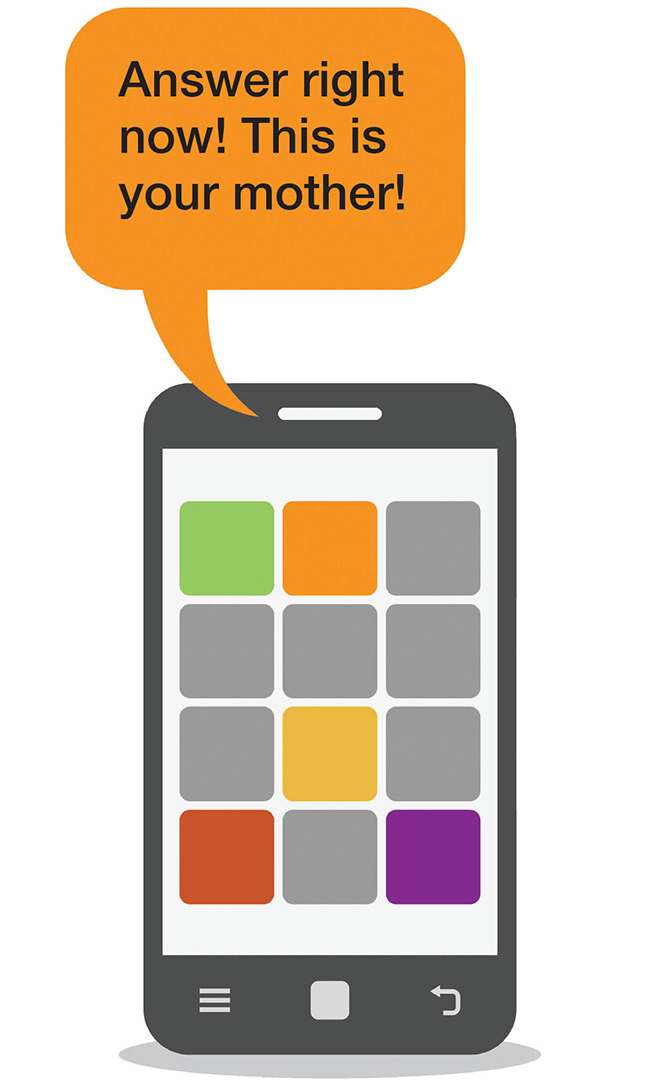
Research tells us that, on average, parents feel comfortable giving smartphones to their kids when those kids are between the ages of 12 and 14.
But wait: A recent survey conducted by Sprint and Techlicious shows that some parents believe kids are ready at age 9, while other parents think 17 is the magic age for first-time smartphone users.
Also, parents don’t always agree with one another: Dads are much more likely to bequeath a phone to an elementary-school-age child, while the moms are more apt to hold out until middle school.
Ah, behold the absolute truth: There’s no one definitive rule book for parents who are navigating this new rite of passage. Luckily, there are people who have made it their business to help parents teach their kids to become responsible, kind and safe cell phone users.
We reached out (via e-mail, still one of our preferred tech mediums) to local and national experts in both the parenting and social media fields. Here are their top dos and don’ts for parents of first-time cell phone users. Read this before you start your holiday shopping and you’ll be ahead of the game.
Before they have the phone
1. Dumb it down
“Do set an age when your child receives a dumb phone, and call it a talk-and-text phone. Obviously it’s different for each child, but I think no earlier than seventh or eighth grade. Age 9 is too young! After one to two years of use, switch to a smart computer phone with limited apps and data minutes. I suggest that kids contribute money or chore time to pay a third of the data charges per monthly bill,” advises Cora Collette Breuner, M.D., who works in adolescent medicine at Seattle Children’s Hospital.
2. Common sense
“Do read the Parental Concerns page at Common Sense Media. You’ll find tons of good information so you know what issues to cover with your child before you start cell phone use,” writes Laura Kastner, Ph.D., a clinical professor of psychiatry and behavioral sciences at the University of Washington and coauthor of Wise-Minded Parenting: 7 Essentials for Raising Successful Tweens + Teens.
3. Sweep through settings
“Before handing over the device for the first time, do set restrictions using the built-in parental controls on the smartphone. This empowers you and your child to learn how to navigate the digital world safely by encouraging a conversation about how they are intending to use the device,” writes Adam Pletter, Psy.D., a psychologist in Bethesda, Maryland, who runs a workshop about parenting and technology called iParent 101.

Make a contract and teach about the social contract
4. House rules
“Don’t make up the phone rules on your own! Creating house rules means kids help craft the positive and negative consequences for following or breaking the rules. Cocreating a contract increases bonding and buy-in from your tween, giving them a voice in something that is going to affect them,” writes Yvonne-Monique Aviva, parent educator and founder of Parent Tool School.
“Do make a drop-off point and time for turning in all family cell phones at night. Developing brains need downtime, and the draw of instant-gratification technology can make it hard for impulse-control-lacking tweens to put the phone down,” advises Aviva.
5. Answer me, this is your mother!
“Do teach cell phone etiquette to new users: when and where it’s appropriate to use a phone; what to say (and not say) over texts; and appropriate time frames for responses,” writes Michelle Icard, author of Middle School Makeover: Improving the Way You and Your Child Experience the Middle School Years.
“Do insist kids respond to parents’ texts or calls right away. Otherwise, if the convenience of communication is gone for the parent, the phone may be gone for the child. Every kid should know that their phone is supplied by their parent as a convenience for both parties,” Icard says.
6. Hold up, Inspector Gadget
“Don’t spy on your kid. Do let them know that you are monitoring their behavior. If you monitor your tween’s cell phone usage without telling them, that’s like sitting rows behind them in the movie theater without telling them. Don’t sneak in and stalk them,” writes Jo Langford, a Seattle-based therapist, sex educator and author of Spare Me ‘The Talk’!: A Guy’s Guide to Sex, Relationships, and Growing Up. He recommends Uknowkids and Qustodio for parents who need monitoring software.
Become app savvy
7. You can do it too
Do let your child be the expert around new apps and/or mobile phone use, and be willing to learn from them, but don’t be afraid of introducing new digital media to your child, too,” writes Katie Headrick Taylor, an assistant professor of learning sciences at University of Washington’s College of Education.
8. Money doesn’t grow on...
“Don’t set a precedent in which the kids can download/buy apps when/however they want. Do set an expectation of a pitch: [They] get two minutes to present their argument for the app, game, etc. Do your own research, compare notes and revisit the conversation,” writes Langford.
Join the larger community conversation
9. Don’t be judgy
“Do talk to other parents about what is happening with kids and cell phones. Don’t be judgmental when you hear about another child making a poor or unsafe decision with their phone. Your child may make a similar mistake down the road,” writes Kim Estes, child safety and prevention educator, and founder of Savvy Parents, Safe Kids.
10. Get meta
“Don’t let them operate in a vacuum. If they are old enough to have a smartphone, they are old enough to read articles and posts [via their phone!] about teen suicides related to cyberbullying, about problems with apps like Snapchat or the role technology played in the Steubenville rapes,” writes Langford.
Science-driven advice
The American Academy of Pediatrics (AAP) just released its key findings from the Growing Up Digital: Media Research Symposium. Here are a few points aimed at parents of tweens/teens:
- Role modeling is critical. Limit your own media use, and model online etiquette.
- It’s OK for your teen to be online. Online relationships are integral to adolescent development. Social media can support identity formation. Teach your teen appropriate behaviors that apply in both the real and online worlds. Ask teens to demonstrate what they are doing online to help you understand both content and context.
- Create tech-free zones.
- Kids will be kids. Kids will make mistakes using media. These can be teachable moments if handled with empathy. Certain aberrations, however, such as sexting or posting images of self-harm, signal a need to assess youths for other risk-taking behaviors.











